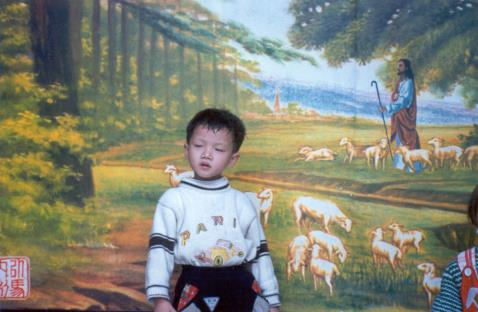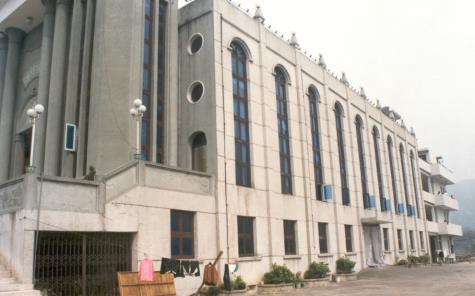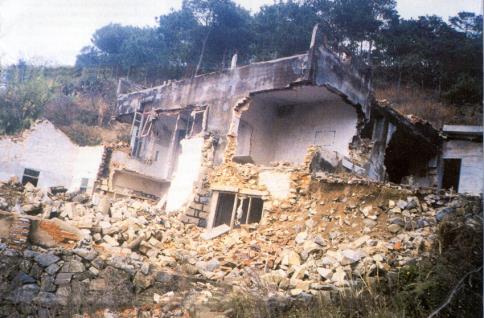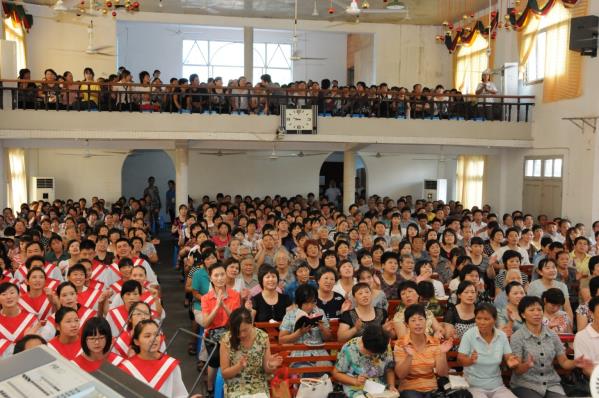Sunday Schools Targeted

A boy standing in front of a painting at a Wenzhou Sunday school.
Christianity in Wenzhou continued to flourish into the new millennium. At the start of the decade, an overview of just the government-approved Three-Self churches in the province noted:
"At present the whole of Zhejiang has 2,600 churches and 3,300 meeting points. There are over 1.4 million believers.... About 70,000 people are added to the church and tens of thousands of revival meetings are held each year. The prosperity of the churches in Wenzhou and Hangzhou is most prominent....
The Church in Wenzhou is growing very fast. There are over 700,000 believers there. The ratio of Christians to the population in this region is as high as 1:10. There are over 2,000 churches and a similar number of meeting points. No wonder the region is known as the Jerusalem of China. One of the characteristics of the Church in Wenzhou is the development of Sunday schools for children. The Church is very serious about ministry for children. Many of the believers were converted when they were little children because of the influence of their Christian parents....
As the number of Christians increases much faster than the number of pastors in China, there is a severe lack of shepherds to guide the flocks. " 1
For many years the Three-Self Patriotic Movement had enforced a policy that no person under the age of 18 could be baptized or receive religious instruction. The independent fellowships of Wenzhou, however, were not bound by that policy and they continued to vigorously train children to follow the Lord. Many of these youngsters then attended state schools during the week, where they witnessed to their classmates and even to their teachers.
The dichotomy between the policies of the Religious Affairs Bureau and the Zhejiang churches was rapidly nearing a confrontation. It arrived in the summer of 2002, when the authorities ordered all churches to stop instructing children under the age of 18. The government assumed that pastors would be unwilling to risk prosecution, but they were wrong. Starting at Wenzhou and radiating out to other parts of the province, church leaders openly defied the policy and continued to hold Sunday Schools and other youth activities. Several churches even held large children's Bible camps, where thousands came to study the Scriptures.
With the threat of arrest hanging over their heads, Wenzhou's Christian leaders used their influence and took the case to the highest levels of power in Beijing. They argued there was no official law in China prohibiting children from engaging in religious activities, but that a policy had been created by the Religious Affairs Bureau without the backing of the law.
Even Bishop Ding Guanxun, the head of the Three-Self Patriotic Movement at the time, supported the Wenzhou church leaders in their bid to end the arbitrary persecution. The Wenzhou Religious Affairs Bureau, not wanting to argue the matter in court, backed down from implementing their policy and the churches continued training their future generations of leaders.
In December 2002, the Washington Post reported on the standoff in Wenzhou, saying:
"After six weeks of the crackdown, the government consented to a meeting with church officials from several districts on July 27. Church officials presented the government with six points, including complaints that churches had been closed illegally, that police and other government officials had overstepped their authority, and that nowhere in Chinese law did it stipulate that minors could not be involved in religion.
The last point was the most explosive.... 'We said there are 13-year-old monks in China who are respected, why can't you have young Christians?' a participant in the meeting recounted. 'The government didn't have anything to say. They knew we knew the law'....
But the fight, it turned out, was not over. The government took the fight into the elementary schools, warning children not to attend Sunday school and banning government teachers from teaching there, cutting their salaries and stopping their promotions if they did.
'We've asked the teachers in elementary schools to persuade their students not to go to church, and we talked to parents as well,' said Xiang Yuenian, a Wenzhou Religious Affairs official. 'We don't have strong or clear law to support us, so it's hard to do this job.... But we must take strong measures to stop such schools. We must take compulsory means to stop such wrongdoing!' ....
The government also demanded that each church fill out a form listing all activities for 2003, saying that from now on each activity must get approval. 'We're not going to fill this thing in,' said the chief pastor at one Wenzhou church. 'If they want to fight us, we will fight them. Jesus is on our side.'" 2

A huge church in Wenzhou where thousands of children were trained in Sunday schools.
The Unique Wenzhou Mission Strategy
The Wenzhou Church had developed differently from churches elsewhere in China. Many Christians in the city were wealthy, with even some billionaires (in US dollar terms) known to be numbered among the believers there. Because of Wenzhou's reputation as a prosperous city, hundreds of thousands of migrant laborers flocked to the city from throughout China. Seizing the opportunity, Christian factory owners used their resources to help spread the gospel. From the start,
"The Church in Wenzhou paid much attention to those laborers, holding evangelistic outreach meetings just for them and providing transportation and meals for these meetings. Believers who are employers made efforts to encourage their employees to attend such meetings, even counting their attendance in the payroll.
The gospel rapidly spread to laborers from other regions, and many have become believers. When the converts return to their hometowns, they take the gospel with them. The Wenzhou churches then send workers to visit them and help build them up." 3
Many Christians from Wenzhou received a vision from God to preach the gospel in remote ethnic minority areas of China, and they often proved to be rugged and effective evangelists. In 2001, a letter was received from a member of the previously unreached Shui minority in Guizhou Province, which said:
"Our church is located in a remote place and transportation is inconvenient. However, the good servants of the Lord have gone to the trouble of traveling a long distance from Zhejiang to this impoverished and destitute place where the Shui minority group lives, in order to share the gospel with us. The brothers didn't mind climbing mountains and wading across rivers. They got blisters on their feet, but they never complained. In a remote and backward place like Guizhou, they willingly endured hard work and planted many churches." 4
By the start of the new millennium, Chinese Christians found it easier to obtain passports, and many Wenzhou believers used their extraordinary entrepreneurial skills to travel throughout Asia, and to far-flung corners of the globe, where they engaged in both macro and micro business enterprises.
Hundreds of individual Wenzhou natives—ranging from restaurant owners to souvenir and peanut sellers—dispersed throughout the world. Journalist David Aikman recalls being in Barcelona, Spain, in the early 2000s, and having a friendly wager with a colleague that within 50-feet (15 meters) of any cathedral in Europe he would find a Chinese Christian from Wenzhou selling something. The following day they went to the door of the famous La Seu cethedral and located three Wenzhou believers plying their trade nearby!
Dozens of churches were established throughout Europe with a three-fold purpose: they were designed first to cater to the spiritual needs of Wenzhou believers far from home; second, to reach other Chinese migrants; and third, to act as bases for outreach to the general populations. In addition to at least two dozen Wenzhou church communities in France, Italy, Spain and the United Kingdom, Aikman was told about
"large communities of Wenzhou Chinese in Khabarovsk, Russia; Bucharest, Romania; and Budapest, Hungary.... Wenzhou business families were often called 'the Jews of China,' for wherever they went they usually succeeded in undercutting and even driving out the non-Wenzhou Chinese.... Everywhere the retail merchants went, it seemed, at least since the 1980s, they also started churches." 5
The Storms of 2000 and 2001

One of more than 1,000 church buildings that were destroyed, banned or confiscated by the government in 2000 and 2001. [VOM]
In 1997 the government of China had launched a blistering attack on church buildings throughout the Wenzhou area, bulldozing more than 400 to the ground.
If the authorities had thought the 1997 campaign would send shockwaves through the Zhejiang Church, they gravely underestimated the tenacity of the body of Christ. The believers in Wenzhou and throughout the province were not dismayed, and they soon resumed their passion for constructing places of worship.
After a few years of relative calm, an even larger campaign of destruction was launched against churches in Zhejiang in late 2000. The Wenzhou Daily newspaper revealed that
"Between mid-November and December 5, 2000, 256 churches were destroyed, 153 banned and 19 confiscated in Ouhai District; 527 churches were destroyed, 35 banned and 74 confiscated in Cangnan County; 4 churches were destroyed and 4 confiscated in Wencheng County; and 9 churches were banned in Taishun County." 6
In total, 1.081 church buildings were destroyed or closed down during just a few weeks of mayhem. Unlike the 1997 persecution, when the authorities had preferred the use of bulldozers to wreak havoc, this time their preference was to simply dynamite churches to the ground.
The Gospel Continues to Blaze
Despite the strong assault on the Zhejiang churches, the revival continued to burn in the hearts of men and women throughout the province. The authorities may have successfully reduced buildings to rubble and closed down many fellowships, but they were unable to prevent the Holy Spirit moving as He pleased in people's hearts, filling the spiritual void that more than half a century of Communism had created.
In 2007, after a decade of persecution had failed to halt the progress of the gospel, one source reported: "In Zhejiang Province a large-scale Christmas evangelistic meeting attracted more than 10,000 people! Two thousand people reportedly expressed a desire to accept Christ." 7
Jesus Christ continued to prove irresistible for multitudes of people throughout Zhejiang. Hundreds of thousands continued to press into the kingdom of God each year, often because of dramatic answers to prayer. Miracles occurred not only among the poor and downtrodden of society, but also in high places.
The head of the Zhejiang Chamber of Commerce suffered from diabetes and terminal cancer, and was afraid he would soon die. On the recommendation of a Christian member of the Chamber, he traveled to Shanghai to see a pastor named Rong who was known to pray for the sick and see many of them recover. After several visits to Rong's house for prayer, the man noticed he was substantially better and doctors finally declared him free of both cancer and diabetes!
The man was a well-known business leader in his region, and a member of the Communist Party. As a result of his healing, "he decided to become a Christian and is now very open about his newfound Christian faith, frequently sharing how God healed him in answer to prayer with his associates in the Chamber of Commerce!" 8
Brutality in Xiaoshan
The hostility displayed by the government against the body of Christ in Zhejiang was by no means confined to Wenzhou. Believers were regularly arrested, beaten and fined throughout the province, but in 2006 a series of particularly brutal and shameful attacks on Christians took place in the Xiaoshan District near Hangzhou.
The worst of these incidents occurred on the afternoon of July 29, at the site of a half-finished church building which had been entirely financed by local believers to serve 5,000 church members. The site originally housed a church that had been constructed in 1921. The building was seized by the Communists in the 1950s, before finally being returned three decades later. For a time the congregation met in an old rented building, but when an opportunity presented itself to buy the land and construct a new place of worship, the believers gave generously and the building commenced.
Hundreds of local Christians gathered at the site that afternoon to pray and worship God, with many elderly church members sitting on plastic chairs surrounding the construction site.
According to Time magazine, at about 2:30 p.m., four bulldozers and hundreds of trucks packed with officers drove to the location. Suddenly,
"Thousands of uniformed police and plainclothes security officers appeared at the construction site. The authorities then demolished the church. Witnesses say police bludgeoned people indiscriminately with nightsticks. 'They were picking up women—some of them old ladies—by the hair and swinging them around like dolls, then letting them crash to the ground,' says a man who watched the clash from across the street....
The Xiaoshan District government described the scene differently, claiming that about 100 Christians 'attacked and injured government officials' and that although the police detained a few protestors, none were injured. But a volunteer interviewed by Time produced receipts from the local hospital attesting to his treatment for broken ribs which he says many others suffered as well. 'They treated us like dead dogs. Some of them scoffed as we lay there saying, 'Where is your God now? If you want to go to heaven, we'll help you get there right now.'" 9
In the aftermath of the brutal and unprovoked attack in Xiaoshan, about 50 believers remained in prison without being formally charged, and several women were in great physical pain as a result of the cowardly beatings they had received. One woman, Wang Aizhen, remained hospitalized with broken chest bones. Most troubling was that several young students could not be found after the incident. They appear to have been taken away to a secret location and tortured.
A Decade of Struggle and Growth

The congregation of the main Three-Self Church in Ningbo, Zhejiang. [RCMI]
The first decade of the twenty-first century concluded with the government of China seemingly incapable of stopping the growth of the Church in Zhejiang. The unregistered house churches in the province were continuing to soar in number, and even the government-sanctioned Three-Self churches were experiencing explosive growth.
Revival was the opposite of what the Communists had planned for, but they were powerless to stop it. Their only response was to lash out, dynamiting church buildings and beating Christians. The more they tried to crush the Church, the larger it grew, and the stronger the faith and determination of God's people became.
By the end of the decade the number of Christians in many cities and counties of Zhejiang was approaching 20 percent of the population. An internal government study lamented that even though Zhejiang was one of the smallest provinces in China, approximately one-tenth of all Christians in China lived within the province.
The 2001 edition of the respected prayer guide Operation World estimated a total of 4.8 million Evangelical Christians in Zhejiang. 10 The decade of 2000-9 ended with a growing sense that the atheist government and the Church in the province had reached an impasse, and one side or the other was likely to gain the upper hand in the long struggle between the forces of light and darkness.
Footnotes:
1. "An Overview of the Church in Zhejiang Province," Lift up Our Holy Hands (February-March 2000).
2. John Pomfret, "Evangelicals on the Rise in the Land of Mao," Washington Post (December 24, 2002).
3. Pray for China (April-May 1999).
4. Far East Broadcasting, October 2001.
5. David Aikman, Jesus in Beijing: How Christianity is Transforming China and Changing the Global Balance of Power (Washington DC: Regnery, 2003), pp. 180-1.
6. Wenzhou Daily (December 12, 2000).
7. Global Chinese Ministries (June 2007).
8. Paul Golf with Pastor Lee, The Coming Chinese Church: How Rising Faith in China is Spilling Over Its Boundaries (Oxford: Monarch Books, 2013), pp. 167-8.
9. Time (August 28, 2006).
10. Patrick Johnstone & Jason Mandryk, Operation World: 21st Century Edition (Carlisle, UK: Paternoster Lifestyle, 2001), p. 181.

© This article is an extract from Paul Hattaway's book 'Zhejiang: The Jerusalem of China'. You can order this or any of The China Chronicles books and e-books from our online bookstore.
